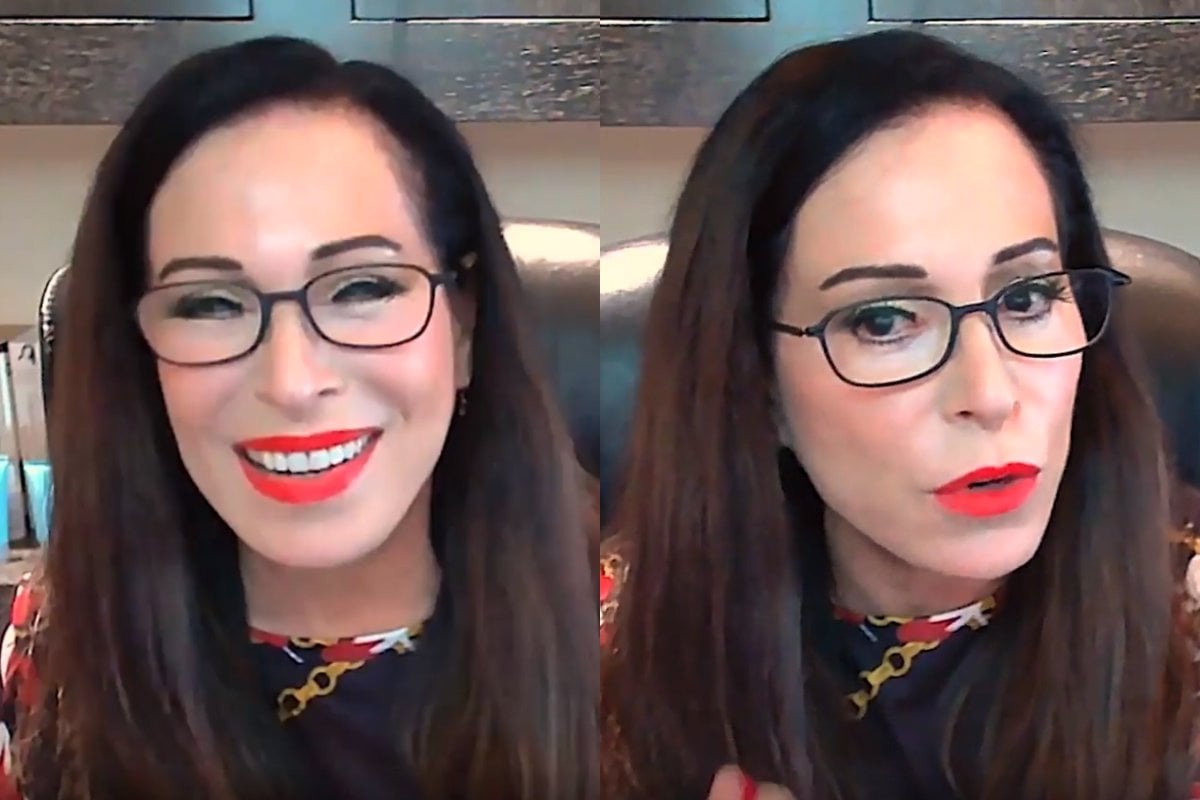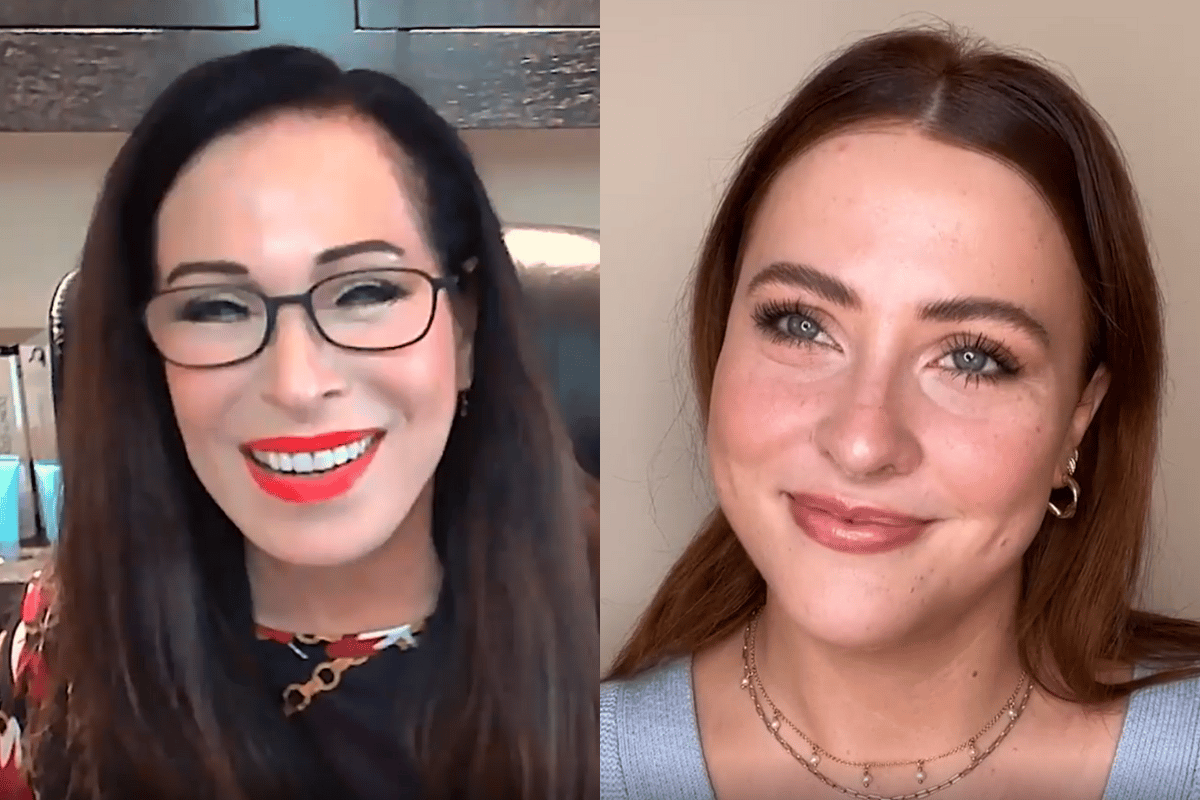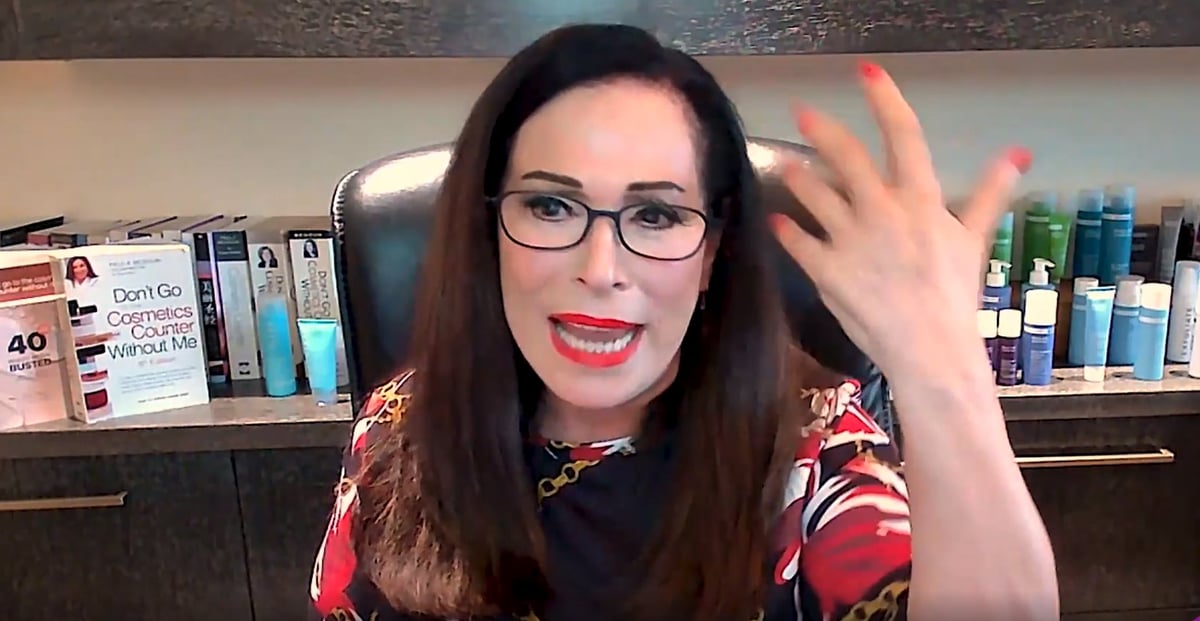
You know what really sucks? Expensive skincare that doesn't work. There's nothing worse than dropping a whole heap of cash on a fancy, hyped-up product, only to try it and realise it does absolutely nothing for your skin.
Ugh.
In a world of pricey products and flashy claims, how do you really know what's worth spending your hard-earned pennies on?
To save you from wasting your time, pennies and skin barrier, we went straight to the big guns: Paula Begoun.
As part of our recent Skin Summit, Mamamia's Lucy Neville sat down with Begoun and asked her ALL the questions - addressing many of the common skincare mistakes we need to stop making.
 Image: Paula Begoun; Lucy Neville; Mamamia
Image: Paula Begoun; Lucy Neville; Mamamia
In case you're not acquainted with Paula Begoun yet, she's the founder of the hugely popular skincare brand Paula’s Choice.
Yes, she's THE Paula from Paula's Choice!
We're not freaking out, you're freaking out.
Known as ‘The Cosmetic Cop’, she's built a solid reputation for her tough, no-BS approach towards skincare products and what you should really spend your money on.
Her advice is always golden. And it's what the industry needs.
Here, we look at nine of the biggest bombshells from Paula Begoun (you might want to take a seat for this).
1. Never spend big on cleansers.
When it comes to cleansers, Begoun said you should always go for cheaper options.
She said, "they tell you skincare contains fancy ingredients; it's such a waste of money. You're literally rinsing it off."
WHERE IS THE LIE, THOUGH.
"You should be using water-soluble cleansers that are gentle, and that take off makeup. Then you can use [them] with a gentle, soft washcloth. They don't need to be expensive. I've been using a soft washcloth for 40 to 50 years. You don't need any extra tools!"
Meaning? All those jazzy cleansing brushes and facial tools are actually super unnecessary. You can literally use a standard face cloth and you'll get the same results, for less money.
So, to recap: "A soft washcloth, a cheap cleanser - easy!"
"Whatever they're telling you about fancy ingredients - remember they are just going down the drain."
2. Expensive sunscreens are a waste of money.
Another HUGE one? "Expensive sunscreens are a waste of money," said Begoun.
"Because you are supposed to be using sunscreen liberally, the more, the better."
As any skin expert will tell you, this is one of the biggest problems with sunscreen - most people don't wear enough of the stuff. You need at least one teaspoon of SPF for your face, ears and neck. And if your go-to sun protection is spendy AF - chances are you won't be slathering enough of it on your face every day.
Makes sense, no?
"SPF 50 or greater is the best - not because you're necessarily getting more protection, but because you're putting on more sunscreen. If you're going to be sweating or swimming, it has to be water resistant, and it has to be cheap - so you can put it on liberally!"
Of course, if fancy or expensive sunscreens are the only sunscreens you'll actually wear - by all means go for it! Just make sure you're applying enough.
3. Most acne products are overpriced.
If you're someone who has experienced relentless breakouts before, you'll know you get to the point where you're willing to try anything. No matter the cost. And as we all know, acne products can be notoriously pricey.
According to Begoun, however, most acne products are an absolute rort, with basic formulations that can often be irritating to the skin.
"Most acne products shouldn't be expensive, but what's expensive is relative. It still has to be well formulated."
"A lot of times these beta hydroxy acid and benzoyl peroxide products come with irritating ingredients. Now that makes it cheaper because it makes it easier to formulate."
"It's hard to formulate and leave out the essential oils - the irritating central oils - so the product smells good. You make it easier for the chemists but it's not good for your skin. Using alcohol is always bad for the skin but it makes stabilising ingredients better - so it still has to be well formulated."
"But BHA products for acne and benzoyl peroxide products for acne do not have to be expensive."
Note taken.
4. Expensive skincare doesn't equal better.
We don't know whether to laugh or cry - but a $200 serum is not better than a $20 serum, friend.
"When you're looking at products that contain retinol oils, niacinamide, omega fatty acids and hyaluronic acids, and are really elegantly beautifully formulated for anti-ageing, and are fighting environmental damage, then you want to spend a little bit more. BUT it still doesn't have to be expensive."
"It just doesn't have to be expensive to be better. That's just BS, do not fall into that trap ever again."
 Image: Paula Begoun; Mamamia
Image: Paula Begoun; Mamamia
But why are there so many expensive products on the market??
Begoun simply said, "Forget that they exist."
"Take that money you're gonna waste on skincare, put it in the bank and save up your money. Then when you need procedures that really do something, you'll have the money in the bank because you haven't wasted it on $300 products that simply can't perform better than the (relatively) cheaper products."
Just to clarify what we're saying here, a $300 moisturiser is not better for your skin because it's more expensive.
"I've been doing this since 1979. I am almost 70 years old. I've been doing it for a very long time. I've written 21 books on skincare. I've formulated over 300 products, and I can say unequivocally, that I have never seen a product over $100 really that is worth the extra money. I haven't seen it."
5. "All natural" is not all it's hyped up to be.
These days it feels like every product on the shelf has the words 'natural' and 'clean' slapped on the front.
Begoun said this way of thinking is ruining the skincare industry.
"What I care about is when companies mislead or hype their products. The "natural" insanity, the "clean beauty" insanity - it's making people afraid of ingredients and they don't need to be afraid."
"For example, you can't make an all-natural sunscreen. It's not possible."
Now, let's read that line again.
"There are very few products in terms of stability, absorption and bioavailability that can be all-natural. Also, 'natural' requires more preservatives - it's less stable than ingredients that are manufactured in a lab. So the best products contain a marriage of both."
6. Age is not a skin type.
PSA: Age is not a skin type. While all those marketing goblins would like to make you believe otherwise, that way of thinking is total rubbish. Begoun said so.
"I remember when I used to have my period, and about a week before I got my period, I would get increased breakouts. This means you need to change your skincare. When your skin changes, you need to consider changing your skincare."
"Age isn't necessarily a skin type (except where oestrogen is concerned). But separate from oestrogen, I have more in common with a young person who has oily skin, breakouts and clogged pores than somebody who is necessarily my age."
"Age is not necessarily part of a skin type. It makes no sense. You take care of what you see and what you're experiencing."
7. You're literally giving yourself all of these skin concerns.
A tough pill to swallow, but according to Begoun, we're often the culprit behind most of our own chief skin concerns. A lot of the time it has... nothing to do with our skin type.
"The problem with identifying your skin type is that often we are creating the skin type we don't want," said told Mamamia.
"If you're using drying cleansers, irritating skincare products, products that are loaded with fragrance and essential oils and alcohol, or if you have oily skin and clogged pores and you're using heavy creams and moisturisers that you think are anti-ageing, you're going to make your skin worse."
"So identifying a skin type is difficult, because the products we use [are] what's creating the problem."
All of these self-made skin issues aside, when asked how you work out your *actual* skin type, Begoun said, "I have no clue."
"My first book came out in 1985 and my goal was to help women not be confused by the insanity in the industry. It's really only gotten worse."
"What I would say is that you have to cover the basics, then treat the specifics. The basics don't always have to be gentle because if you irritate your skin in any way (whether that's with cold water, hot water, harsh scrubs etc.), then you're making your skin worse."
Facts, people.
8. There are only two ingredients that offer immediate results.
Begoun said that when it comes to results, most ingredients have to be used consistently over a period of time in order for you to see any visible difference in your skin.
There are, however, two ingredients that will give you immediate results. Any guesses?
"The only product that you can really tell how it's working for you is an AHA or BHA because alpha hydroxy acids and beta hydroxy acids work fairly immediately," she said.
"In fact, when you use a well-formulated AHA or BHA, you can see a difference in your skin within the next day or two."
Other products like sunscreen or products that contain antioxidants, retinol, niacinamide or hyaluronic acid, are what Begoun call 'relationship products'. Meaning? Their benefits can be seen over time.
"It can take several months to see a difference or you're really doing it for maintenance or prevention. If you put on a bad product, you wouldn't necessarily know."
"For example, if you put on a daytime moisturiser that doesn't have a high SPF and is water resistant - you wouldn't know that you're ageing your skin and potentially causing skin cancer. You wouldn't know that until 10-15 years later when the brown spots and the wrinkles come up."
9. Expiry dates are "a bit of a joke".
Mind. Blown.
"I hate those expiry dates. If you have bought a product and you haven't used it up by the expiry date, it's probably because you didn't like it - or it wouldn't still be there in your skincare routine."
So, should we just ignore expiry dates? How important are they?
"The expiry date is more significant when the product comes in a jar or if you've bought a 30ml product, and it's still there past that little expiry date - then you didn't like it. So you should have returned it already."
"I wouldn't want somebody keeping a product of mine around for that long that they just never used. So I think the expiry date is a bit of a joke. Especially for cleansers."
'We have it on a lot of products just because people put it on and because people expect it nowadays."
Want to read all the great tips Paula Begoun shared with Mamamia? Head here.
Did you miss The Skin Summit presented by Mamamia? Get on-demand access to the best skin experts in the world. Whether you love nerding out over a 12-step skincare routine or still use a bar of soap, the summit is the secret to the best skin of your life. Streaming directly to your couch. Catch up on-demand here.
You can follow Paula Begoun on Instagram.
Feature Image: Mamamia.
